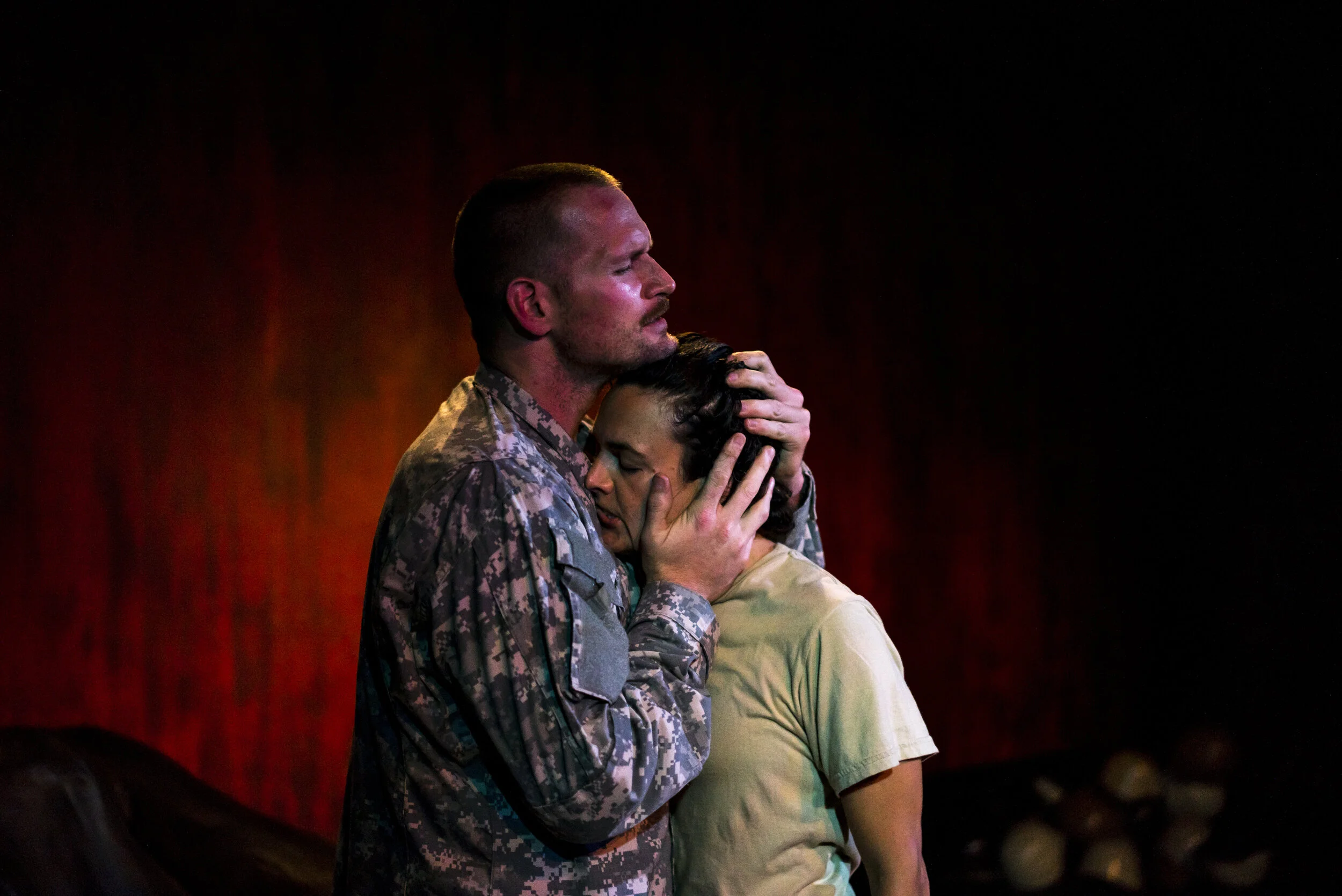"Ajax in Iraq" (Review) -- People's World
Review originally posted by Eric A. Gordon at http://www.peoplesworld.org/two-plays-about-command-rape-in-war-and-in-the-office/
Of an estimated 123 plays Sophocles (c. 496-406 BCE) is said to have written, only seven, all tragedies, remain extant. Ajax is the earliest of these, written c. 439 BCE. It treats a heroic warrior who is driven mad - by the gods, of course - in one of the many Greek wars whose details are forgotten by all but scholars. And even the historians debate what those wars were really about - surely not about Helen of Troy, "the face that launched a thousand ships."
Ajax in Iraq brilliantly mashes together the 2500-year-old drama with a modern reiteration under the hot sun of present-day Iraq, where A.J. (Courtney Munch) is a female soldier recently integrated into full combat roles in our new gender-neutral U.S. military. Although the play by Ellen McLaughlin is only about 90 minutes long without intermission, we get a full measure of both the ancient tragedy and the contemporary allegory that riffs off it.
Ajax (Aaron Hendry) takes on a mistress Tecmessa (Alina Bolshakova) from a nation he has subdued, forcibly raping her within earshot of his confused co-combatants, who feel paralyzed to act in defiance of their glorified commander. In time, Tecmessa bears him a son and remains loyal, if for no other reason than that if she loses him she and her son would become slaves.
But Ajax is taking his military leadership to ever more violent extremes. It's hardly enough to slaughter soldiers and civilians wholesale with no eye to honor or justice. At its height his madness becomes psychopathic as he kills the creatures in every shepherd's flock that he can find.
Sophocles' Ajax is perhaps the first clear case of Post-Traumatic Stress Disorder (PTSD) in literature.
Out of a clutch of forlorn soldiers barely knowing what the hell they are doing in Iraq after so many years of mission drift, A.J. distinguishes herself by singlehandedly hauling out the bodies of her mates after an explosion traps them inside a pile of rubble. Without even a passing thought of self-preservation, she brings all her comrades out to safety and receives the gratitude and honors of her crew. How does her Commanding Sergeant (James Bane) congratulate her? By viciously, mercilessly raping her to show her who is top dog in this company. Like her Sophoclean namesake, she too loses her mind in a paroxysm of rage against the poor animals belonging to the Iraqi peasants who should be grateful that the U.S. has come to "liberate" them.
All the while, the serene goddess Athena (Joanna Bateman) reflects on the raw scene with wise, sardonic remove, as if the gods too are incapacitated in the face of the numberless pointless atrocities committed by these crazed, vengeful mortals. "The difference between you and someone who can do unspeakable things?" she asks rhetorically to the audience. "Not so great."
In every way Ajax in Iraq is a consummate collective victory by the Not Man Apart Physical Theatre Ensemble. The high-energy 15-member cast starts off with a ballet of rhythmic military exercises, and except for a few lulls of card-playing and gossiping among the troops, it's an athletic event throughout, directed with an ever-present sense of doom and terror by John Farmanesh-Bocca. Music plays almost constantly (sound design by Adam Phalen), making this, in the original Greek sense, a "melodrama," theatre accompanied by music.
Many Americans are alienated from these wars we fight. A play like this reminds us it's not over yet for our soldiers. Any of these "heroes" may be coming home as profoundly damaged souls in need of the best possible psychological care they can get - and often do not. It's appropriate to remember that two ex-soldiers, one from the war in Afghanistan and one from Iraq, were the U.S. military-trained sharpshooters who recently unleashed their rage by killing policemen in Dallas and Baton Rouge.
In Sophocles' day, the Greek chorus that comments on the action and takes the time in the end to assess its meaning, provided audiences at a performance of Ajax sufficient catharsis to help them move on with their daily affairs, psychically informed, morally improved. The week that saw the premiere of Ajax in Iraq also saw the announcement of another several hundred U.S. troops committed to that sorry, afflicted land. How can there be catharsis for us? How can we even grant ourselves permission for it?
Ajax in Iraq plays at the Greenway Court Theatre, 544 N. Fairfax Ave., Los Angeles 90036. Performances continue through August 14, Fridays & Saturdays at 8 pm and Sundays at 7 pm. Free parking in the lot adjacent to the theatre. For reservations and information, visithttp://www.greenwaycourttheatre.org/ajaxiniraq/ or call (323) 673-0544.
